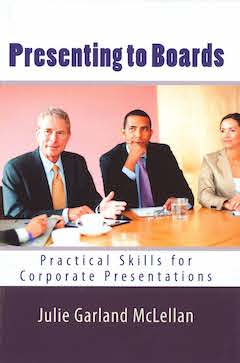|
|
|
|
|
|
|
|
|
Dear reader,
Welcome to The Director's Dilemma July 2023
Each month this newsletter looks at a real-life board scenario and considers a range of responses. The scenarios are de-identified to protect the individuals concerned. This month we consider how a board can diligently discharge its duties if the papers contain information that is incorrect.
Of course, scenarios in this newsletter are general, I work with boards and directors as a confidential mentor and help them beat challenges and seize opportunities. If you would like personalised service, please call me.
To read this email in a web browser, go to www.mclellan.com.au/newsletter.html and click on 'read the latest issue'. I hope you will enjoy the latest dilemma:

Elizabeth was thrilled to join the board of a government trading enterprise that delivers essential services and has the potential to make a large contribution to the nation's environmental performance.
She has become concerned because board papers are frequently revised after they have been issued to the board. While she understands that there is always a need to balance issuing the papers in a timely manner with providing the latest and most accurate data, she has difficulty keeping track when documents in the portal are altered.
At her most recent board meeting an important investment decision was called for. Management had prepared a paper and it all appeared quite straightforward. During the meeting, management informed the board that some numbers in the paper were incorrect and offered a verbal change to the figures.
The CEO expected the board to simply note the new financial details and approve the decision based on the paper. Some directors were deeply uncomfortable with doing that. Others were more sanguine. The discussion on whether they could or could not use a paper with incorrect financial information as the basis for their decision quickly grew heated, and the Chair called for a break to allow directors to regain their composure.
Elizabeth used the break to call an experienced director friend and ask for advice.
What should she do?
|
|
|
|
Sonal's Answer

In Elizabeth's situation, there are several actions she could consider depending on the specifics of the situation, her relationship with the rest of the board, and the culture of the organization. This is a compromise of the formal board governance process, however insignificant the changes may seem.
Elizabeth could :
-
Call for resubmission : Ideally, Elizabeth could recommend that the paper be re-submitted to the board after corrections are made. This would ensure that all directors have updated information and the document trail is clean. At the very least, if the changes are not of significant impact, she could suggest the issuing of an errata sheet noting the corrections. This would formally ensure that changes are tracked and documented.
-
Discuss the Issue : As approving significant investment decisions based on verbally adjusted data presents significant governance and financial risk, Elizabeth might consider a direct conversation with the Chair / CEO / risk committee (or equivalent) to review these practices.
-
Intervention : Given that last minute changes seem to happen often, it would also be prudent to formally recommend a review of the documentation process and training to reduce such incidents.
As a board member, her focus should be on providing timely strategic impetus, but equally on ensuring that decisions are made based on accurately documented information to protect the stakeholders, and indeed, her position and reputation as a board member.
Sonal Agrawal is AltoPartners Global Chair, Accord | India Managing Director & AESC Global Board Member. She is based in Mumbai, India.
|
|
|
|
Julie's Answer

When board papers are not reliable, directors should become concerned. This situation is now intolerable. The board cannot risk making a substantial investment decision based on financial information that is not documented.
Elizabeth should first consider whether the decision must be made now. If it can be deferred, even for a week, that would allow time for management to write a new paper with the correct financial information.
Given the history, I would suggest bringing in external expertise to help management verify their data and write an acceptable business case that will underpin a responsible decision. When there is reliable information, a decision can be made.
If this is a big investment, there are likely to be stages in the process, and Elizabeth should look to see if the board can make a decision to proceed with the next step without committing to the whole process. Again, this will buy the board time to verify the information and gain some shred of confidence that management are capable of managing the process to a successful conclusion.
The board should review previous communications with stakeholders, including the relevant Minister and Department, to ascertain what commitments have been made, and what consequences a delayed or partial decision might have for them.
Finally, the board should ensure that it regains the ability to discuss difficult topics and make decisions without unhelpful friction or lack of respect. At the moment, Elizabeth should work to rebuild the team and trust. In the near future she should work with the board chair to help instigate a board review.
Julie Garland McLellan is an experienced non-executive director and board advisor based in Sydney, Australia.
|
|
|
|
Jeremy's Answer

Dear Elizabeth,
As a Board Director, we have fiduciary responsibilities to report accurate information and news to our shareholders, stakeholders and the general public.
Given this specific situation involves money and is tied to an important investment decision, it is all the more crucial that the financial information and data is accurate and audited.
Furthermore, your organisation is a government enterprise, which may involve the use of public funds to drive national environmental impact projects.
Independent auditors and advisors can be brought in to assist in this scenario as well, to ensure the numbers are derived and deduced in an autarkic manner and process.
It is important to always remain impartial especially when dealing with financial figures and decisions.
It prevents the risk of facing a conflict of interest and prevents diluting the authenticity of the investment in this case.
The CEO is this scenario also seems to be pushing for an approval, but he or she also needs to understand the perspective of the Board to ensure decisions are made based on unambiguous data and financial counsel.
Further and more dialogue it seems is needed to understand the CEO's perspective on this matter and how the Board can support Management to make wise investment decisions.
Sincerely,
Jeremy Tan
Jeremy Tan is Group Executive Director of Exelco and Executive Director of PTC - Fayat Group. He is based in Singapore.
|
|
|
|
Chat GPT's Answer

Elizabeth, in this challenging situation, it's important to approach it with clarity and professionalism. Here are some key pieces of advice to consider:
Communicate your concerns: Express your worries about the frequent revisions of board papers to the Chair and other relevant board members. Emphasize the need for accurate and reliable information for effective decision-making.
Document discrepancies: Keep a record of the changes made to board papers and note the impact they may have on decision-making processes. This will provide evidence of the issue and can help initiate discussions on improving the document management process.
Request clarification: During the break, gather your thoughts and prepare specific questions to ask management about the inaccuracies in the paper. Seek detailed explanations and request written confirmation of any changes made to the figures.
Consult experienced directors: Continue seeking advice from experienced directors or mentors who have dealt with similar situations. Their insights can provide guidance on how to navigate the complexities of the boardroom.
Advocate for transparency and integrity: Push for a discussion on implementing stricter controls and processes to ensure the accuracy and consistency of board papers. Suggest the establishment of a review system or a designated point of contact to address any document-related concerns.
Consider your options: If the issue persists and your concerns are not adequately addressed, evaluate the impact on your role as a board member. Assess whether you can effectively fulfill your responsibilities and make informed decisions under these circumstances.
Remember, your role as a board member is to act in the best interest of the organization and its stakeholders. By voicing your concerns, seeking clarity, and advocating for transparency, you can help foster a culture of accountability and improve the decision-making process within the board.
|
|
|
|
Video resources - I post short video insights on LinkedIn. They disappear after a few days. You might like to visit (and please subscribe to) my YouTube channel to see the videos whenever you want to watch them. Let me know if there are any topics you would like to see addressed.
Board training - Every board - just like every other team - needs to train and develop if it is to achieve and sustain success. When your board next needs to conduct training please remember that I would be delighted to help. If I can help, please contact me at julie@mclellan.com.au.
Book Review - Presenting to Boards: Practical Skills for Corporate Presentations
 A book of practical skills and tips for making successful board presentations. A book of practical skills and tips for making successful board presentations.
Much is at stake when one makes a Boardroom presentation. Presenters are asking for consideration and decision-making at the highest level; gaining acceptance of new strategic proposals; making high-level sales involving significant investments; or building shared understanding and common identities. The ability to present effectively to boards is often important to career success.
Yet presenters are often unaware of the dynamics acting upon a director. Board protocols, behaviours, and legal liabilities may be very different from those in executive life. Understanding the boardroom environment is therefore fundamental to presentation success.
Most information on presenting is designed to help reluctant presenters to survive their ordeal. Very little is written or taught about how to excel and how to meet and surpass the expectations of highly discerning corporate audiences. Yet that is what boardroom presenters must do.
This book provides practical skills that will help make your boardroom presentations successful.
Written by an internationally acclaimed expert on corporate governance and filled with real life anecdotes and helpful tips, this book is a 'must read' for any executive who aspires to succeed in presenting at the highest corporate level.
Available at Amazon.com
Inspirational quote for July

I heard the term 'Infobesity' at a recent conference. It is going to become a favourite!
Almost as dangerous as relying on incomplete or inaccurate information; bloated packs that are too big for mere mortals to digest can undermine your board's ability to contribute. If your board papers have started to show signs of unhealthy weight gain, call me to discuss how to train your team in writing better papers.
A note on names - A few readers have asked me where I find the names for the protagonists in each case study; I 'borrow' them from people I meet or things that I read. Elizabeth is derived from an old Hebrew name and means "God is my oath".
This newsletter - If you have any ideas for improving the newsletter please let me know. If you are reading a forwarded copy, please visit my website and sign up for your own subscription.
Suggestions for dilemmas - Thank you to all the readers who have suggested dilemmas. They are greatly appreciated. I will answer them all eventually. I could not write this newsletter without your help and without the generous help of all the experts who respond each month to the case studies.
Be a contributor - if you would like to attempt a response to the dilemmas for publication you will be most welcome. Simply reply to this email and let me know. I am always on the lookout for new talent from around the world so please reach out if that sounds like something you could do. I am also always grateful for the generous sharing of the current and past contributors. I couldn't create such an engaging newsletter without their help.
Let's connect - I use LinkedIn to share information about boards and directorship with my friends and acquaintances. If you use LinkedIn and we are not yet connected I will welcome a connection from you. You can find me at linkedin.com/in/juliegarlandmclellan.
Farewell until the next issue due 1 August. I look forward to greeting you again then.
Enjoy governing your companies, it is a privilege!
Best regards,
Julie

Main photo by Vlada Karpovich at Pexels.com
Quote illustration Keitchy Sanchez for Julie Garland Mclellan
Disclaimer: The opinions expressed above are general in nature and are designed to help you to develop your judgement as a director. They are not a definitive legal ruling and do not constitute legal advice. Names and some circumstances in the case study have been changed to ensure anonymity. Contributors to this newsletter comment in the context of their own jurisdiction; readers should check their local laws and regulations as they may be very different.
Privacy: I am privileged to have your contact details and keep them as safely as possible. I will alert you if they are ever accessed by any unauthorised person. The technical staff at ayuda help with publishing and issuing the Director's Dilemma and have access so they can send the newsletters to you. I do not sell your details to anyone; they are kept only for the intended purpose - sending you this newsletter and helping to build the judgement of company directors by providing a safe way to consider potential responses to real life events.
|
|
|
|
|
|
|








